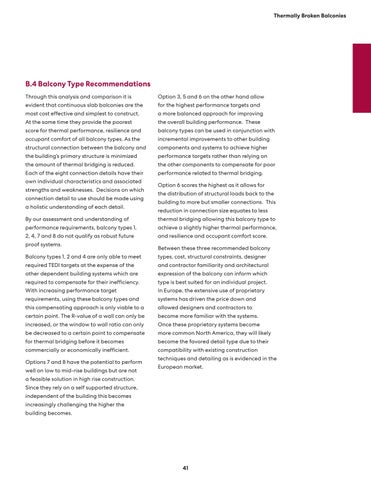Thermally Broken Balconies
B.4 Balcony Type Recommendations Through this analysis and comparison it is
Option 3, 5 and 6 on the other hand allow
evident that continuous slab balconies are the
for the highest performance targets and
most cost effective and simplest to construct.
a more balanced approach for improving
At the same time they provide the poorest
the overall building performance. These
score for thermal performance, resilience and
balcony types can be used in conjunction with
occupant comfort of all balcony types. As the
incremental improvements to other building
structural connection between the balcony and
components and systems to achieve higher
the building’s primary structure is minimized
performance targets rather than relying on
the amount of thermal bridging is reduced.
the other components to compensate for poor
Each of the eight connection details have their
performance related to thermal bridging.
own individual characteristics and associated strengths and weaknesses. Decisions on which connection detail to use should be made using a holistic understanding of each detail.
Option 6 scores the highest as it allows for the distribution of structural loads back to the building to more but smaller connections. This reduction in connection size equates to less
By our assessment and understanding of
thermal bridging allowing this balcony type to
performance requirements, balcony types 1,
achieve a slightly higher thermal performance,
2, 4, 7 and 8 do not qualify as robust future
and resilience and occupant comfort score.
proof systems.
Between these three recommended balcony
Balcony types 1, 2 and 4 are only able to meet
types, cost, structural constraints, designer
required TEDI targets at the expense of the
and contractor familiarity and architectural
other dependent building systems which are
expression of the balcony can inform which
required to compensate for their inefficiency.
type is best suited for an individual project.
With increasing performance target
In Europe, the extensive use of proprietary
requirements, using these balcony types and
systems has driven the price down and
this compensating approach is only viable to a
allowed designers and contractors to
certain point. The R-value of a wall can only be
become more familiar with the systems.
increased, or the window to wall ratio can only
Once these proprietary systems become
be decreased to a certain point to compensate
more common North America, they will likely
for thermal bridging before it becomes
become the favored detail type due to their
commercially or economically inefficient.
compatibility with existing construction
Options 7 and 8 have the potential to perform well on low to mid-rise buildings but are not
techniques and detailing as is evidenced in the European market.
a feasible solution in high rise construction. Since they rely on a self supported structure, independent of the building this becomes increasingly challenging the higher the building becomes.
41







